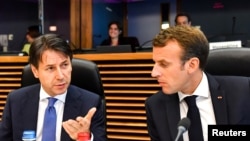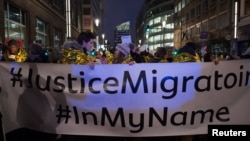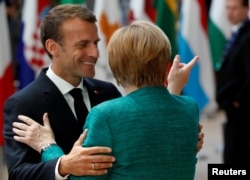Italy has blocked the adoption of any agreements at the European Union summit in Brussels, demanding that the bloc do more to help Rome’s migration crisis.
Italy’s month-old populist government refused to sign any joint agreements, instead holding out for action by other European countries to help deal with the migrants and refugees coming to Italy from North Africa.
“Italy doesn’t need any more verbal signs, but concrete deeds,” Italian Premier Giuseppe Conte said.
Summit participants are planning to set up screening facilities in North African countries to slow the stream of people crossing the Mediterranean Sea to get to the EU, often through Italy. While no countries have as yet agreed to host such screening posts, EU leaders hope to entice them with aid money.
EU leaders have one more day at the summit to bring Italy on board on issues that include trade and defense along with migration.
Arrivals to the continent have dropped sharply since a 2015 crisis that drew sharp divisions among the bloc’s 28 members about how they should respond. Some countries promoted more open-door policies, while others set up barriers to prevent those who reached Europe from crossing their borders.
The EU said in 2015 there were more than 1.8 million illegal border crossings into member countries. EU President Donald Tusk wrote in a letter ahead of the summit the number of illegal crossings has dropped by 96 percent since its peak.
Policies already enacted have helped push that number down, notably an agreement with Turkey for the Turkish government to help cut off migration routes and to accept the return of those who make the journey from Turkey to Greece. The EU also began work to tackle the root causes pushing people from their home country.
German Chancellor Angela Merkel, who was among the most open to accepting migrants during the height of the crisis, is under pressure at home from critics who say Germany has been too welcoming.
She told parliament Thursday before heading to Brussels that she made the right decision in an exceptional situation, but that with the current situation the EU should put in place tighter controls. Merkel said that while there is division among members, they are united in the need to reduce overall migration, stop smugglers and strengthen the EU’s external borders.







